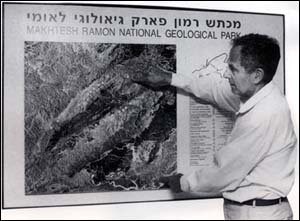
Institute environmental scientist Prof. Emanuel Mazor is working to ensure that in the 21st century Israel follows the path of sustainable development, one that does not involve destruction of the environment. This is no trivial task considering that the country's population is expected to reach 8 to 10 million in 2020 and its urbanized areas may triple or quadruple in size by that date.
Mazor is taking an active part in drafting "Israel 2020" -- a master plan for the country's development in the next century -- which is being prepared by the Technion-Israel Institute of Technology and will by submitted to the government in 1996. He has suggested concise guidelines, referred to as planning precepts, to be followed in every new construction or development project. Some of these emphasize aesthetic aspects of development, including the creation of scenic entrances into every town, while others focus on environmental issues, such as encouraging municipalities to adopt various water-saving measures.
To prevent Israel from being overtaken by monotonous, over-urbanized landscapes, Mazor proposes granting every new neighborhood or town a unique identity by bringing out its most striking natural attraction, such as a lake, cave, dune, oasis or archeological site. When plans are prepared for a new settlement, these features should be brought to the forefront -- for example, by building a nearby promenade or making them the center of a municipal park. Prof. Mazor is no newcomer to environmental policy matters. Since the late 1970s, he has fought to preserve Israel's Negev desert and prevent it from becoming the country's garbage dump. Under his leadership, a unique geological structure in the central Negev, known as Makhtesh Ramon, has been transformed into the Makhtesh Ramon National Geological Park.
Most recently, the Israel government has declared the part of the Negev known as Makhtesh Country a protected area -- thanks to a nationwide campaign spurred largely by Mazor.
Prof. Mazor, a member of the Weizmann Institute's Department of Environmental Sciences and Energy Research, holds the Frank D. Considine Chair of Hydrological Research.
